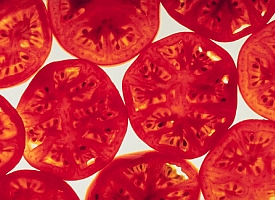Researchers at the Agricultural Research Service (ARS) in Beltsville, Maryland have introduced a new gene to tomatoes that help make the fruit last longer in stores and at home. The team published their findings in the February issue of the U.S. Department of Agriculture’s Agricultural Research magazine, and last fall in The Plant Journal (paid subscription required). ARS is a division of USDA.
Autar Mattoo, a plant physiologist with ARS’s Sustainable Agricultural Systems Laboratory, and colleagues Avtar Handa and Savithri Nambeesan, focused on manipulating a class of nitrogen-based organic compounds known as polyamines. These compounds act as signals and affect a plant’s growth, flowering, fruit development, ripening, and other functions.
Polyamines have also been linked to the production of lycopene and other nutrients that lower our risk of developing certain cancers and other diseases. Lycopene is an antioxidant compound that gives tomatoes and certain other fruits and vegetables their color.
The researchers introduced a yeast gene, known as spermidine synthase, into tomato plants specifically to increase production of a single polyamine, called spermidine, one of three polyamines believed to slow the plant-ripening process. The results suggest that introducing the gene not only increased spermidine levels and vegetative growth, but also extended the tomato’s shelf life after harvest.
Shriveling of the modified tomatoes was delayed by up to three weeks, and they experienced a slower rate of decay caused by tomato plant diseases. The modified tomatoes also had higher levels of the antioxidant lycopene.
The study indicates that spermidine has its own effects, independent of the other polyamines, in extending tomato shelf life and increasing growth. Polyamines are found in other plants, so this work could assist in efforts designed to extend the post-harvest shelf life of other crops.
Read more: New Process Breeds Resistance to Potato, Tomato Blight
* * *


 RSS - Posts
RSS - Posts
[…] Read more: Genetic Modification Leads to Longer Tomato Shelf Life […]